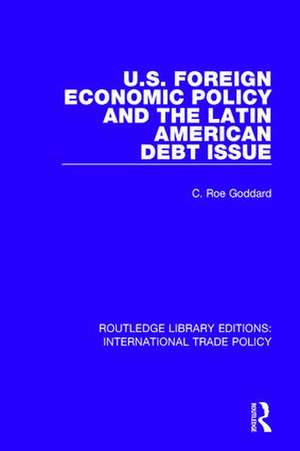U.S. Foreign Economic Policy and the Latin American Debt Issue: Routledge Library Editions: International Trade Policy
Autor C. Roe Goddarden Limba Engleză Hardback – 12 oct 2017
| Toate formatele și edițiile | Preț | Express |
|---|---|---|
| Paperback (1) | 218.38 lei 43-57 zile | |
| Taylor & Francis – 8 mai 2019 | 218.38 lei 43-57 zile | |
| Hardback (1) | 399.05 lei 43-57 zile | |
| Taylor & Francis – 12 oct 2017 | 399.05 lei 43-57 zile |
Din seria Routledge Library Editions: International Trade Policy
-
 Preț: 323.23 lei
Preț: 323.23 lei -
 Preț: 132.04 lei
Preț: 132.04 lei - 34%
 Preț: 680.73 lei
Preț: 680.73 lei -
 Preț: 323.23 lei
Preț: 323.23 lei - 34%
 Preț: 597.20 lei
Preț: 597.20 lei -
 Preț: 321.84 lei
Preț: 321.84 lei - 34%
 Preț: 769.92 lei
Preț: 769.92 lei -
 Preț: 323.23 lei
Preț: 323.23 lei -
 Preț: 329.88 lei
Preț: 329.88 lei -
 Preț: 323.23 lei
Preț: 323.23 lei -
 Preț: 211.47 lei
Preț: 211.47 lei -
 Preț: 211.47 lei
Preț: 211.47 lei - 34%
 Preț: 597.20 lei
Preț: 597.20 lei -
 Preț: 317.01 lei
Preț: 317.01 lei -
 Preț: 319.39 lei
Preț: 319.39 lei - 34%
 Preț: 736.38 lei
Preț: 736.38 lei -
 Preț: 323.23 lei
Preț: 323.23 lei -
 Preț: 218.38 lei
Preț: 218.38 lei - 34%
 Preț: 12260.08 lei
Preț: 12260.08 lei - 34%
 Preț: 597.20 lei
Preț: 597.20 lei -
 Preț: 436.14 lei
Preț: 436.14 lei - 11%
 Preț: 399.05 lei
Preț: 399.05 lei -
 Preț: 323.23 lei
Preț: 323.23 lei -
 Preț: 323.23 lei
Preț: 323.23 lei -
 Preț: 323.23 lei
Preț: 323.23 lei -
 Preț: 323.23 lei
Preț: 323.23 lei -
 Preț: 323.23 lei
Preț: 323.23 lei - 31%
 Preț: 456.63 lei
Preț: 456.63 lei - 34%
 Preț: 680.73 lei
Preț: 680.73 lei - 18%
 Preț: 891.36 lei
Preț: 891.36 lei - 34%
 Preț: 680.73 lei
Preț: 680.73 lei - 14%
 Preț: 680.73 lei
Preț: 680.73 lei
Preț: 399.05 lei
Preț vechi: 577.99 lei
-31% Nou
Puncte Express: 599
Preț estimativ în valută:
76.36€ • 79.94$ • 63.18£
76.36€ • 79.94$ • 63.18£
Carte tipărită la comandă
Livrare economică 07-21 aprilie
Preluare comenzi: 021 569.72.76
Specificații
ISBN-13: 9781138106109
ISBN-10: 1138106100
Pagini: 172
Dimensiuni: 156 x 234 x 15 mm
Greutate: 0.45 kg
Ediția:1
Editura: Taylor & Francis
Colecția Routledge
Seria Routledge Library Editions: International Trade Policy
Locul publicării:Oxford, United Kingdom
ISBN-10: 1138106100
Pagini: 172
Dimensiuni: 156 x 234 x 15 mm
Greutate: 0.45 kg
Ediția:1
Editura: Taylor & Francis
Colecția Routledge
Seria Routledge Library Editions: International Trade Policy
Locul publicării:Oxford, United Kingdom
Cuprins
1. The International Debt Crisis Enters the 1980s 1.1. National Factors 1.2. International Factors 2. U.S. Intervention in the Debt Renegotiations of Mexico, Brazil and Argentina: An Effort in Market Maintenance 2.1. Mexico: Test Case for Crisis Management 2.2. Brazil: U.S. Resists Efforts to Bypass Established Mechanisms 2.3. Argentina: The More Things Change the More They Stay the Same 3. A Systemic-Centred Explanation of U.S. Foreign Economic Policy and the Latin American Debt Crisis 3.1. Systemic-Centred Explanations 3.2. Interdependence 3.3. International Regime Analysis 3.4. The Evolution of the International Financial System: Centralized/Official to Decentralized/Private 4. Common Beliefs, Values and Perspectives: the Economic Culture of the Reagan Administration 4.1. Beliefs Systems, Shared Values and the Study of Foreign Economic Policy 4.2. The Fostering of a Liberal Trade and Financial Regime: Theoretical and Institutional Roots 4.3. The Free Market Ethos and the Reagan Administration’s Debt Policy 5. Anatomy of the State: The Role of Governmental Structure and Process 5.1. Revival of ‘The State’ as a Conceptual Variable 5.2. The Independence of U.S. International Monetary Policy-Making 5.3. Private International Banks and Debt Policy 5.4. Historical Evolution of the Organization: The Rise of the Treasury Department 5.5. The Role of the Fed 5.6 The Department of State: Where Art Thou? 5.7. The Failure of Coordination 5.8. The Limited Involvement of the President and Its Impact on Policy 5.9. The Role of the National Security Council and the Senior Interagency Group on International Economic Policy (SIGIEP) 5.10. On the Periphery: Congress and the Making of U.S. Debt Policy 6. Conclusion 6.1. The Post-1985 Period
Descriere
This reissue (1993) examines US policy toward the Latin American debt crisis, 1982-5. Reagan maintained the problem as a private creditor/debtor issue, avoiding internationalization of the problem. With the election of Bush government policy changed, and this book analyses the different approaches, and the successes and failures of their policies.
